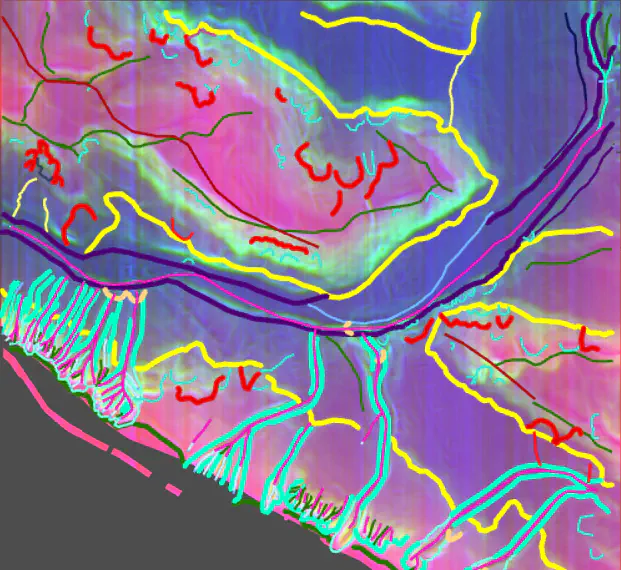Machine Learning How to Sea
 Submarine map enriched with geological lineaments, using data from the Italian MaGIC project. (C) 2021 Raska Soemantoro and Mario Gaimann.
Submarine map enriched with geological lineaments, using data from the Italian MaGIC project. (C) 2021 Raska Soemantoro and Mario Gaimann.
This project is about automatically recognizing submarine structures using artificial intelligence and high performance computing. Submarine structures are of general interest because some of them are considered geohazards, such as submarine canyons for example. In the past, researchers classified and marked these geohazards by hand in maps of the seabed (so called morphobathymetric maps). Here, we are going to devise an automated approach using machine learning strategies. The model we develop will be able to locate and mark these geohazards automatically on an arbitrary morphobathymetric map.
The project is part of the PRACE Summer of HPC 2021, a High Performance Computing (HPC) internship programme by the Partnership for Advanced Computing in Europe (PRACE). The host organization of this project is the Italian supercomputing consortium CINECA, which is part of the European HPC network PRACE. I work together with my fellow intern Raska Soemantoro (University of Manchester, UK, now: Cranfield Unviersity, UK) as well as my supervisors Dr. Silvia Ceramicola (Italian National Institute of Oceanography and Applied Geophysics (OGS) in Trieste, Italy), Dr. Veerle Huvenne (UK National Oceanography Centre (NOC) in Southampton, UK) and Dr. Massimiliano Guarrasi (CINECA in Casaleccio di Reno, Italy). Being part of such an interdisciplinary and international team feels exciting!
Our project has been awarded the PRACE Summer of HPC 2021 Best Performance Award, which we will receive as part of the EuroHPC Summit Week 2021 held in Paris, France, from 22 to 24 March 2022.
For the next round of our project, we secured an HPC-Europa3 Grant as part of the Transnational Access Programme for a Pan-European Network of HPC Research Infrastructures and Laboratories for Scientific Computing, funded by the European Union’s Horizon 2020 framework. We are both excited to continue our research in March and April 2022 in Trieste.